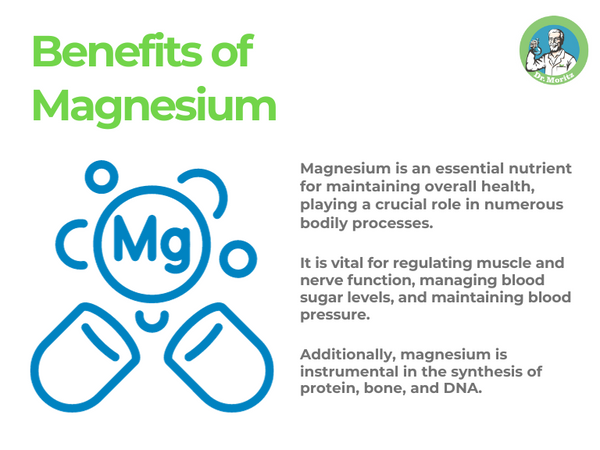Ever asked yourself 'what type of magnesium should I take?' Keep reading to learn more about the differences, benefits, and best choices among different magnesium forms. Dive in to make an informed decision.
Recognizing a deficiency in magnesium is only scratching the surface; the true challenge is pinpointing which specific type of magnesium your body is craving. Each form of magnesium plays a unique role, addresses different symptoms, and offers distinct benefits.

In this comprehensive guide, we’ll explore various types of magnesium, understand the signs of deficiency, unravel their benefits, and identify food sources rich in each form.
Magnesium Citrate
Magnesium citrate is a potent and well-absorbed form of magnesium, resulting from the combination of magnesium with citric acid, a compound found naturally in citrus fruits. This form is well-known for its enhanced bioavailability and superior absorption.

Symptoms of Deficiency: Individuals low on magnesium citrate may experience constipation, muscle spasms, and irregular heartbeat, indicating the body’s need for this specific form.
Benefits: Primarily known for supporting digestive health, magnesium citrate acts as a gentle laxative, aiding in relieving constipation. Additionally, it plays a vital role in energy production and muscle relaxation, contributing to overall well-being.
Food Sources: Citrus fruits such as oranges, lemons, and grapefruits are rich in citric acid, which can facilitate the absorption of magnesium, making them excellent dietary sources.
Magnesium Glycinate
Magnesium glycinate is a blend of magnesium and the amino acid glycine. This form is renowned for its calming effects on the brain and does not exhibit laxative properties, making it a preferable choice for those seeking to enhance mental well-being.

Symptoms of Deficiency: A lack of magnesium glycinate may manifest as heightened stress, anxiety, depression, and disrupted sleep patterns.
Benefits: Beyond its calming effects, magnesium glycinate aids in improving overall sleep quality, alleviating symptoms of depression and stress, and promoting mental tranquility.
Food Sources: Foods rich in amino acid glycine, such as meat, fish, dairy, and legumes, can be paired with magnesium-rich foods like nuts, seeds, and leafy greens to enhance the intake of magnesium glycinate.
Magnesium Malate
This form pairs magnesium with malic acid, naturally occurring in fruits and wine. Magnesium malate boasts high bioavailability, making it an optimal choice for replenishing magnesium levels.

Symptoms of Deficiency: Chronic fatigue and muscle pain are indicative of a shortage in magnesium malate.
Benefits: Known for its energy-boosting properties, magnesium malate is recommended for those experiencing fatigue and muscle discomfort. However, it may be stimulating for some and disrupt sleep if taken at night.
Food Sources: Fruits such as apples and cherries, rich in malic acid, coupled with magnesium-rich foods, can enhance the absorption of magnesium malate.
Magnesium Taurate
Magnesium taurate combines magnesium with the amino acid taurine, yielding benefits for heart health and stress reduction.

Symptoms of Deficiency: Elevated blood pressure, irregular heartbeat, and increased stress levels may signal a deficiency in magnesium taurate.
Benefits: This form is instrumental in regulating blood sugar, blood pressure, and promoting cardiovascular health. It also plays a role in reducing cortisol levels and increasing calming neurotransmitters.
Food Sources: Consuming taurine-rich foods like meat and fish along with magnesium-rich foods can aid in obtaining adequate magnesium taurate.
Magnesium Threonate
Magnesium threonate is a specialized form chelated to threonic acid, a metabolite of vitamin C, renowned for its ability to cross the blood-brain barrier, making it exceptionally beneficial for cognitive health.

Symptoms of Deficiency: Cognitive decline, memory loss, and difficulty concentrating may be indicative of a magnesium threonate deficiency.
Benefits: This unique form of magnesium is associated with improved cognitive function, enhanced memory, and offers protection against brain cell death, making it an ideal choice for supporting brain health.
Food Sources: While threonic acid is a derivative of vitamin C, combining vitamin C-rich foods like oranges, strawberries, and bell peppers with magnesium-rich foods can potentially support the levels of magnesium threonate.
Magnesium Sulfate
Comprising magnesium, sulfur, and oxygen, magnesium sulfate is commonly known as Epsom salt. It’s extensively used for soothing sore muscles, alleviating muscle cramps, and as a component in skincare products.

Symptoms of Deficiency: Muscle soreness, cramps, and skin irritation may suggest a need for magnesium sulfate.
Benefits: Beyond muscle relaxation, magnesium sulfate is employed in hospitals to address kidney issues in children and prevent pregnancy complications. It also acts as a natural laxative, aiding digestive health.
Food Sources: While magnesium sulfate is not typically found in food, incorporating sulfur-rich foods like garlic, onions, and cruciferous vegetables alongside magnesium-rich foods can be beneficial.
Magnesium Chloride
Magnesium chloride is bonded with orotic acid, a substance involved in the construction of genetic material, making it an exceptional choice for heart health and popular among athletes.

Symptoms of Deficiency: A deficiency in magnesium chloride may manifest as cardiovascular issues and decreased athletic performance.
Benefits: Magnesium chloride is known for aiding energy production in the heart and blood vessels, supporting cardiovascular health and athletic performance. It's easily absorbed and doesn't have strong laxative effects.
Food Sources: Seafood, especially seaweed, is a rich source of magnesium chloride. Combining it with orotic acid-rich foods like milk and yogurt can optimize the absorption of this form of magnesium.
What Type of Magnesium Should I Take
Knowing the different types of magnesium is key to taking a more tailored approach to your health. Adding a variety of foods rich in magnesium to your diet is important, and including supplements can further support your health.
Recognizing the specific benefits of each form of magnesium allows you to meet your body’s unique needs effectively. For a wide selection of magnesium supplements, visit our website and make an informed choice for your individual health requirements.
To get more in-depth information about magnesium and its different types, be sure to check out the articles below:
The Comprehensive Guide to Types of Magnesium: What You Need to Know
Unlocking Restful Nights: What Type of Magnesium is Best for Sleep
Easing the Pain: What Type of Magnesium is Best for Leg Cramps

